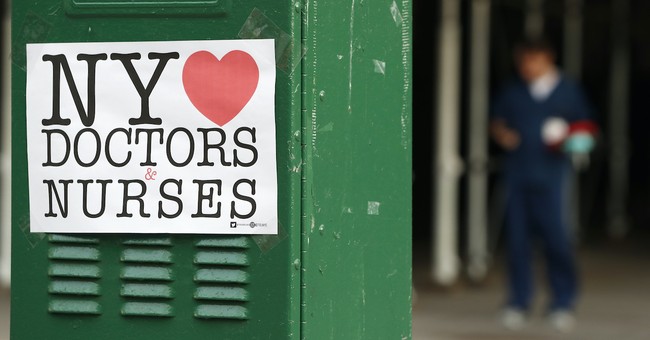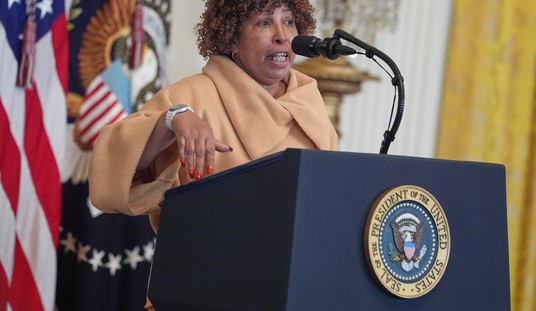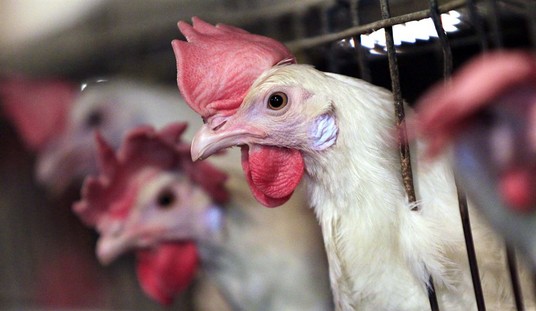
A sign acknowledging the work of doctors and nurses is posted on a traffic control box outside Brooklyn Hospital Center, as a hospital worker, right, waits for a traffic light to change before reporting to duty, Sunday, April 5, 2020, in New York. The Brooklyn hospital is one of several in the area treating high numbers of coronavirus patients. (AP Photo/Kathy Willens)
C. S. Lewis once wrote that much “wickedness, when you examine it, turns out to be the pursuit of some good in the wrong way.”
If we examine our pursuit of the good deed of saving lives from the Coronavirus, would we see that the dictates of “social distancing” and the shutdowns have become “cures,” as Trump fretted, that are worse than the virus?
The “models” that formed the basis for our nation’s response have been proven hugely erroneous, and the one-size-fits-all strategy devised has caused massive, mounting collateral damage. Yet even as the modelers adjust their death projections significantly downward and the destruction rises, governors and other officials all over the country not only have not adjusted their response, they have instead tightened up the one-size-fits-all shutdown even further.
In healthcare, one-size-fits-all programs are perfect examples of Lewis’s warning: they begin as “benefits” but too often turn out to be limits. If you’ve ever had to appeal to Medicare on behalf of a loved one when their particular health situation needed some kind of exception (which, since everyone is different, pretty much means everything), you know that’s true, and it certainly feels wicked. I’ve written about how ObamaCare has given us a peek at what could happen when government invades our personal space and the privacy of our physician’s examining rooms. Now, in a very big way with this virus response, we’re seeing government work to find treatments and assist hospitals, but also invade our homes, neighborhoods, and businesses — imposing on our very way of life.
Socialized medicine, Medicare for All, single-payer, or whatever it’s called at the moment, will be full of one-size-fits-all rules, procedures, benefits, restrictions, and reimbursements — along with a gigantic government bureaucracy to handle it all. Programs that bring with them solutions as shapeless as a one-size-fits-all hospital gown: not fitting anyone particularly well, with lots of strings attached, and yet still won’t stay closed in the back. Programs that usually require the patient to be modified to fit into it, and not the other way around.
At the moment, our nation’s leaders have chosen a one-size-fits-all strategy to combat Covid-19. The virus, on the other hand, certainly doesn’t seem to infect everyone in a one-size-fits-all way. Neither does the one-size-fits-all strategy itself affect everyone in the same way, as we’ve seen, for example, those whose employment has been most impacted by definitions of “essential.” We’re discovering options of several effective treatments, and identifying the types of communities and living conditions where the virus spreads more easily and quickly. We’re learning that it mostly affects the elderly with significant pre-existing conditions. Percentages and figures, when the media or various reporting entities dare to reveal them, show this is true.
However, when we dare to bring up questions about the lockdown, we’re accused of not “caring about Granny.” But, has anyone asked Granny how she feels about this? If she’s okay with, for example, her grandchildren’s schools being shut down for months, or that her son is now unemployed from a “non-essential” job and devastated at no longer being able to provide for her grandchildren — all in the intention of keeping her “safe”?
On the other hand, our senior citizens are consistently asked, before their admission to hospitals, nursing homes and assisted living facilities, the difficult and uncomfortable questions about signing advance directives, living wills, and DNRs. In the UK, the NHS handles senior healthcare with “care pathway” guidelines that take into account age and underlying conditions before denying treatments. Other countries, and even some states, have considered or already legalized euthanasia for the elderly. And abortions are considered a “right” and regularly performed for reasons such as lack of financial preparation or bad timing.
These things are awful to think about. The ideas of abortion and euthanasia are the very definition of wickedness. Signing documents in anticipation of death is heartwrenching. The need to model deaths – both direct and indirect – because of a virus pandemic is tragic. Every life is precious, at every age, in any and every condition — and that is the point. Are we pursuing good — care for certain, identifiable groups at greatest risk from Coronavirus infection — without due care and consideration for the rest? Is our fight against untimely death destroying the living, and life itself? Can’t we do better?
Beyond the thousands dying of the complications of Covid-19, thousands more are suffering from depression, abuse, addiction, and a host of other psychological issues from the lockdowns. Our social cohesion and our nation’s psyche have been damaged and may never fully recover. The massive economic destruction may mean that our future resources to care for our own families as well as others will be severely limited.
As Editor R. R. Reno wrote at First Things:
Our finitude always requires the hard moral labor of triage. That demand is now more visible, because the potent virus puts great pressure on our immune systems and healthcare systems. But it is always there.
Put simply: Only an irresponsible sentimentalist imagines we can live in a world without triage. We must never do evil that good might come…But we often must decide which good we can and should do, a decision that nearly always requires not doing another good, not binding a different wound, not saving a different life.
We can work to take care of those most susceptible to death from this virus, while also having consideration for the lives of others. And we can focus resources on finding cures and treatments and helping those who suffer from the lockdowns, rather than things like making sure too many kids might be playing together in the park. We can do this. Let’s focus on pursuing good, in the right way.














Join the conversation as a VIP Member